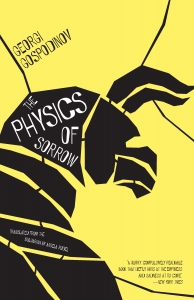
Georgi Gospodinov is a celebrated contemporary Bulgarian author who pertains to our screening as two of the shorts being shown are adapted from his work, Blind Vaysha and The Physics of Sorrow.
Gospodinov found early success as a poet, his first work Lapidarium, a poetry collection, won the National Prize for Best Literary Debut Yuzhna Prolet in 1992. His work identified with postmodernism whilst concentrating on the quotidian world (Just Festival, 2021).
Blind Vaysha was published as part of a collection of short stories titled And Other Stories (2001) and centres around a girl who is blinded by only being able to see the past through her left eye and the future with her right. Gospodinov expertly details how humanities obsession with the past and fear of the future impedes the ability to live in the now.
The Physics of Sorrow is partly a reactionary work as Gospodinov speaks on “the saddest place in the World”- a title The Economist branded Bulgaria and Romania with in 2010. Gospodinov speasks on this tuga, a Bulgarian word that describes “a longing for something that hasn’t happened”, and a great sense of sadness and grief. The novel draws upon “the non-eventfulness” of post-Communist Bulgaria as it follows a man as he reminisces about his childhood and attempts to understand the purpose of his life. Despite the Bulgarian centrality of the novel, The Physics of Sorrow resonated with people and had a much broader reach than any of Gospodinov previous work. (Greenwell, 2015).
In 2013 Gospodinov published a collection of essays and stories entitled The Invisible Crises which refers to “the censorship in Bulgaria [that] obstructs the possibility of noticing the censorship in Bulgaria”. This book is divided into two sections The Negated World and Marked by Literature, the former of which alludes to the forgotten years of socialist Bulgaria. This environment is one that is also inherently familiar to Theodore Ushev who left Bulgaria in 1999, ten years after the fall of communism. Ushev has previously described the communist era of Bulgaria as “dark and scary”, this understandably trickles down into the themes of his work, the same of which can be said for Gospodinov (Robb, 2019).
Ushev on Gospodinov-
“The way Gospodinov writes corresponds very much with my conception of filmmaking. Very simple phrases, but with a rich construction, quotes and games. Absolute postmodernism play with the narrative and the visuals.” (Mitchell, 2016)
“The reason this book resonates so much with me is that it was “my story”. I felt as if Gospodinov spoke with the voice of my generation. When he talks about his childhood, he talks about mine as well. We often joke that we’re the Minotaurs from the dark basements of our small, provincial towns. “I am us””. – On The Physics of Sorrow (Mitchell, 2019)
Economist Staff, 2010. The rich, the poor and Bulgaria. [online] The Economist. Available at: <https://www.economist.com/christmas-specials/2010/12/16/the-rich-the-poor-and-bulgaria> [Accessed 7 October 2021].
Goukassian, E., 2018. Georgi Gospodinov: enter the world of the Bulgarian writer taking on empathy, sorrow and stereotypes. [online] The Calvert Journal. Available at: <https://www.calvertjournal.com/articles/show/10556/georgi-gospodinov-bulgarias-most-translated-contemporary-writer-on-empathy> [Accessed 7 October 2021].
Gospodinov, G., 2007. And Other Stories. 2nd ed. Illinois: Northwestern Univeristy Press, pp.55-58.
Gospodinov, G., 2013. The Invisible Crises. 1st ed. Sofia: Janet 45.
Gospodinov, G., 2015. The Physics of Sorrow. 2nd ed. New York: Open Letter, pp.1-290.
Greenwell, G., 2015. The Bulgarian Sadness of Georgi Gospodinov. [online] The New Yorker. Available at: <https://www.newyorker.com/books/page-turner/the-bulgarian-sadness-of-georgi-gospodinov> [Accessed 7 October 2021].
Just Festival. 2021. Georgi Gospodinov. [online] Available at: <https://www.just-festival.org/georgi-gospodinov/> [Accessed 7 October 2021].
Smith, N., 2012. Franz Kafka: The Meaning of Life is that it Stops. [online] The Vienna Review. Available at: <https://www.theviennareview.at/archives/2012/franz-kafka-the-meaning-of-life-is-that-it-stops> [Accessed 4 November 2021].
Mitchell, B., 2016. Theodore Ushev discusses latest work ‘Blind Vaysha’. [online] Skwigly. Available at: <https://www.skwigly.co.uk/theodore-ushev-blind-vaysha/> [Accessed 7 October 2021].
Mitchell, B., 2019. Theodore Ushev discusses his masterful new film ‘The Physics of Sorrow’. [online] Skwigly. Available at: <https://www.skwigly.co.uk/theodore-ushev-physics-sorrow/> [Accessed 7 October 2021].
Sarto, D., 2017. The Past and Future Torment the Present in Theodore Ushev’s ‘Blind Vaysha’. [online] awn.com. Available at: <https://www.awn.com/animationworld/past-and-future-torment-present-theodore-ushev-s-blind-vaysha> [Accessed 7 October 2021].
Schlicke, J., 2019. “The meaning of life is that it ends.”. [online] CE: Forward. Available at: <https://ceforward.com/2019/09/the-meaning-of-life-is-that-it-ends/> [Accessed 14 October 2021].